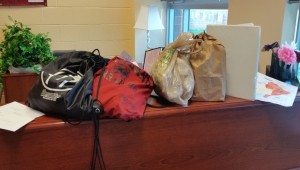Con: Schools overstep their authority by restricting drop-offs
October 12, 2015
Forgetfulness is part of human nature, something children and adults both suffer from. When we forget something, we often beat ourselves up about it.
Lake Mary High School has a policy in place banning all drop-off items</a>. Normally when students forget their homework, sports equipment, lunches, etc., calling or texting their parents and asking them to bring these items is a piece of cake.
Lake Mary High School has asked students and parents to “Please plan accordingly.”
The policy left numerous parents and students in shock. The intention of this regulation is to teach students responsibility and limit the amount of traffic coming in and out of school.
While this policy does have its pros, there are still many cons.
In any case, parents should have access to their students throughout the school day.
Knowing that a parent is there for you and able to drop-off items in an emergency can take much of the stressful pressure off. If a certain parent is constantly bringing his/her child homework assignments, the frequent offender can be dealt with separately.
Assistant principal Mr. Andrew McWilliams, said,”If a parent needs to bring something for a child, that’s within the parent’s right.”
Mr. McWilliams said that even though responsibility is important for being successful, it is not part of the curriculum. Responsibility should be enforced by parents. Parents can decide when bringing forgotten items is appropriate.
Should the school expect so much of students? We often stay up late completing hours of homework assignments, and wake up before 7:30 every morning. School personnel should be more understanding.
Elizabeth McWilliams, a junior, argues that this policy is unfair because “…they (the school system) make us get up so early. It’s not fair to expect us to be completely put together and have everything because we are tired from late nights of practice, homework and performances.”
Students with separated or divorced parents should not be held responsible for leaving an item behind. They could have half of their possessions at one parent’s house and keep the remainder of their belongings at the other parent’s house. This situation has become pretty common. According to the Center for Disease Control and Prevention, about half of all marriages end in divorce.
English teacher and LHS parent Damon Norko strongly disagrees with establishing this rule. He believes that the policy is too extreme. He also believes we should go about the problem “case by case.”
Parents of students with identified special needs might have a hard time adjusting to this rule. For example, if a boy with contacts runs out of eye drops and cannot concentrate on schoolwork, he would not have the freedom to ask a parent to drop off a new bottle. Also, if a girl with a memory disorder regularly forgets her homework, she would not be able to ask a parent to drop off her assignments.
Norko believes the school should be lenient towards those with limitations; however, other students might claim this is unfair.






